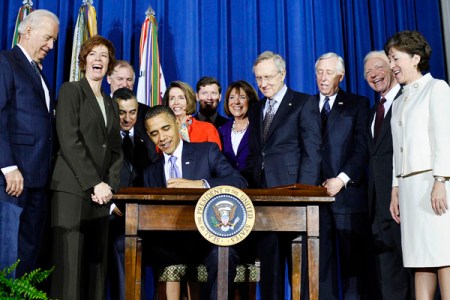US President Barack Obama signs the Don't Ask, Don't Tell Repeal Act of 2010 into law at the Department of the Interior in Washington, DC, on December 22, 2010. (Photo: Jewel Samad / Getty Images)
So Pentagon enforcement of “Don’t Ask, Don’t Tell” stopped happening Friday. As of Monday morning, the U.S. military seems none the worse off. It appears – and I may yet regret saying this – that the Pentagon’s formal, 17-year ban on gay men and women serving openly in uniform is more likely to end with a whimper than a bang.
For the second time, a federal court has ordered the military to stop enforcing discrimination against homosexuals, contending it’s unconstitutional. Because the Pentagon appears to be on the verge of certifying that terminating the ban will not hurt national security, there’s doubt inside the military that the Obama Administration – which itself has pledged to end the ban – will pursue a court appeal so that it can enforce it for a few weeks longer.
Clifford L. Stanley, undersecretary of defense for personnel and readiness, has ordered the services to obey the injunction. “It remains the policy of the Department of Defense not to ask service members or applicants about their sexual orientation, to treat all members with dignity and respect, and to ensure maintenance of good order and discipline,” he told the services’ civilian secretaries in a memo. “Further, because the injunction is once again in effect, the department will process applications for enlistment or appointment without regard to sexual orientation.”
Last fall, then-Defense Secretary Robert Gates directed that any discharges under the law had approved by the service secretaries in consultation with Stanley and the Pentagon’s top lawyer – all political appointees. Four service personnel have been booted from the military since that October order.
Also on Friday, the House voted 236 to 184 to ban same-sex wedding at military posts. It was the latest effort by House GOP members to delay the end of “Don’t Ask, Don’t Tell.” Rep. Tim Huelskamp (R-Kan.), who authored the of amendment to the defense spending bill, said he wanted to make sure that “America’s military bases are not used to advance a narrow social agenda.” The measure would bar funding to train military chaplains to perform same-sex marriage (although if they need special training for this, the military is in deep trouble).
The debate over gays in uniform has been troubling to cover. The true cost of “Don’t Ask, Don’t Tell” became clear to me in 1999, when I traveled to Fort Campbell, Kentucky, following the murder of Private First Class Barry Winchell, killed because a fellow soldier thought he was gay. It focused my mind: while the government plainly didn’t sanction Winchell’s murder, it nurtured the conditions that let it happen. The ban promoted deception, lying, blackmail and a government-approved reason for thinking that gay people were less than their straight counterparts. The military had been ordered by Congress to turn Army barracks into Petri dishes ripe for violence.
I recently recruited Officer X to post on Battleland. He has to do so anonymously because being gay remains a bar to service until “Don’t Ask, Don’t Tell” is formally lifted (which is different from not enforcing it). Officer X is a gay military pilot who wants to serve his country. Over drinks recently, he seemed equal parts patriot, proud troop, funny guy and truth teller. We’re lucky to have him, and people like him, in uniform.


